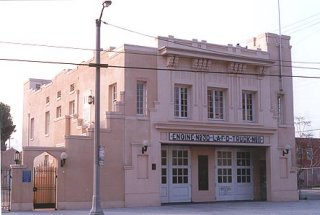
It's Easy!
Foreword:
Hi everyone and welcome to a small tutorial about how to get backgrounds for Sierra-AGI-adventures from photos. This technique is heavily used during the production of our adventure "V", as it allows
us to have actual movie stills as rooms for our game. The only thing you need (besides Picedit) is a program for editing pictures and a great photo. This is already the first big issue, because the
quality of the photo decides about the quality of the room.
The most important thing when you choose your photo is that it must not be too deep in dimensions: If the floor in the photo covers some hundert square feet and you turn that into an AGI-room, the scene will look distorted, because the objects in the background get smaller the further away they are, but the size of the player character stays the same. In our example, I have chosen a photo from a fire station in Los Angeles. You will notice that the walkable area is really very small, just some inches to walk and the rest is just background. That makes turning it into an AGI-room quite easy.

After you have chosen a photo, you have to make sure the proportions of the photo fit the proportions of the player character. Otherwise a door from within a photo will be twice as big as the player character. This gives the scene a distorted look. To give your room the right proportions you have to experiment around with a photo-editing tool. In my example, I didn't have to do anything, the photo did already have the right proportions when I saved it as a 320x200 PCX-file. Otherwise I would have had to make the photo smaller or bigger. When the photo is made smaller, you will have some areas in the PCX-file which are just plain white. This is no problem, when these areas are not too big. In my example, there's something missing on the right side of the picture:
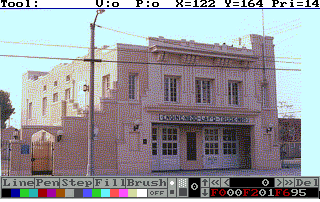
You have to use your imagination for what the photo might look like in the missing area. When your photo has the right size, convert it to a PCX-file with a resolution of 320x200 in 256 colors. You then have to copy the file into the folder where you have Picedit. In my example, the file is called no30.pcx. Start Picedit with:
C:\picedit.exe picture.pcx
If your picture is called picture.pcx, so that you can have the picture in the background when you draw your room.
In Picedit, it is best to begin with the basic outlines of what is in the picture.
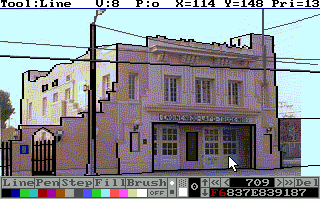
I try to give most of the things in the picture a black outline for contrast reasons. But this is just my personal taste, you'll have to experiment around with this. Sometimes it looks quite nice to leave the outlines away, but if you use no outlines at all, the scene will look quite weird.
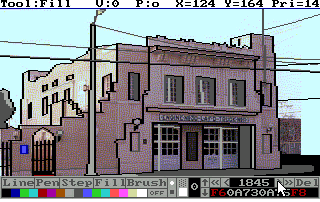
After I've done the outlines, I begin to paint some basic shadings. As our scene is supposed to be a night-scene, I use mainly black and grey for this.
Now's the time to decide about some basic colors. As it's a nightly scene, I've chosen the darker red as primary color of the house. I can then use light red for the area where the streetlight is and brown for the darker side of the house.
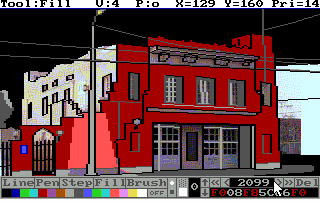
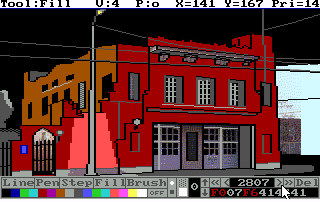
Now there is only one area of the picture missing: the right side where the photo suddenly ends. I've chosen to take a normal city-skyline for that area, As I want the player to be able to walk around the right corner of the house, I had already painted the street leading around the corner. For the skyline I simply draw some squares...
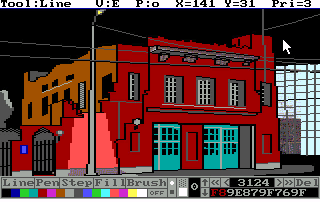
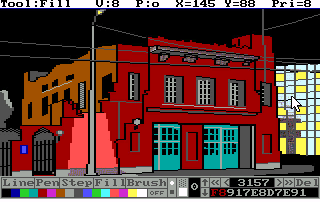
...fill some of them with yellow...
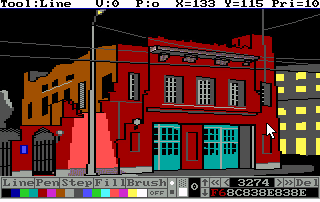
... the others with gray...
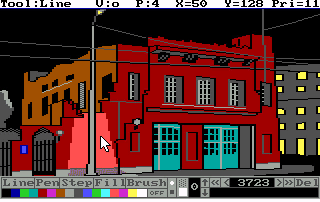
...and then I do some outlines again to finish the scene. Voila.
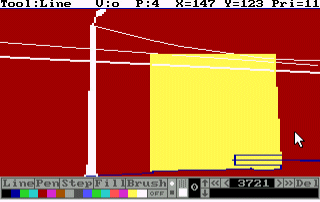
Note that putting the streetlight and the wires to the foreground was in vain, because the player can't walk behind them. The only important thing on that screen is the yellow square for the corner of the house.Here is what the priority screen looks like.
Björn Kahlenberg
Top
You can help keep The Sierra Help Pages and its affiliates alive by helping to defray some of the costs of hosting this site. If it has been of help to you, please consider contributing to help keep it online.Thank you.
The Sierra Help Pages | Sierra Game Help | Walkthroughs | Hints, Tips & Spoilers | Utilities | Links | SHP Forums | Search
© 2013 to present The Sierra Help Pages. All rights reserved. All Sierra games, artwork and music © Sierra.